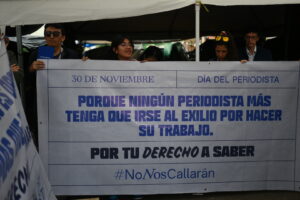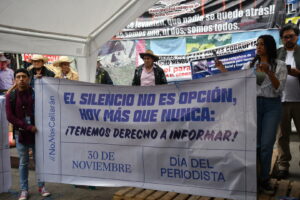Journalist's Day in Guatemala should be a time of celebration. However, this year has been a day for peaceful protest and for the publication of awareness campaigns about attacks on the press and citizens' right to know.
All this in the midst of increasing restrictions on the work of journalists in the Central American country.
The collective of journalists organized as NoNosCallarán took advantage of the day to publish the first chapter of an audiovisual series titled “Por tu derecho a saber” (For your right to know) on its social networks.
"We’ve been working on this campaign since April and we’ve been delaying it due to the national strike in Guatemala. Taking advantage of National Journalists' Day, we posted the testimonies of three journalists who talk about the attacks they suffered and why the press is important in Guatemala," journalist Daniel Villatoro, communications director for the campaign, told LatAm Journalism Review (LJR).
The campaign's first video features Rony Ríos, Gersón Ortiz and Alexander Valdéz, journalists who were exiled due to the persecution of newspaper elPeriódico's investigative work. "We’ve been away from Guatemala for almost a year... the public prosecutor's office tried to criminalize our work... but we’re not the only ones who’ve paid the price," the journalists said collectively in the video.
@nonoscallarangt_ Capítulo 1📹: Salir para seguir contando la verdad ✍🏻 Más de 20 periodistas han tenido que salir al exilio para continuar narrando la realidad y fiscalizando al poder. Conoce a Gerson, Rony y Alex, tres periodistas que desde fuera siguen defendiendo tu derecho a saber. 🗣️ #NoNosCallarán #30deNoviembre #guatemala #periodistasdeguatemala #gt #502 #periodistasdeguatemala ♬ original sound - #NoNosCallarán
Journalist Marielos Monzón told LJR that this campaign seeks to raise awareness among the public about how important journalism is for society and for democracy.
"It boils down to the fact that when they attack or silence a journalist, what they are attacking is the right of the population to be informed. We’re not only defending our profession, we’re defending citizens and their right to know," she said.
Journalism is under constant attack in Guatemala. In August of this year, journalists Frangely Alonzo López and Hugo Gutiérrez were murdered and the case is still unpunished.
Also, according to NoNosCallarán, between May 2022 and October 2023, twenty-six journalists went into exile to protect their integrity and freedom. In addition, the president of the newspaper elPeriódico, José Rubén Zamora, was sentenced to six years in prison for money laundering after a controversial trial. Later, an appeals court overturned his conviction and ordered a retrial. However, he remains in jail.
"In 2023, multiple aggressions from state and private actors were recorded, such as surveillance, harassment and digital attacks that included hacking of social media accounts and the sites of news outlets; blocking of information sources; attacks and pressure against advertisers, and death threats. Colleagues working in municipalities and departments, as well as women journalists, continue to be extremely unprotected," the group said in a statement to the press.
Between Jan. 1 and Nov. 29, 2023, the Observatory of Journalists in Guatemala recorded 171 attacks or limitations to the press. These include judicial harassment, threats, defamation and obstruction of the source [impediment to free access to the source].

According to NoNosCallarán, between May 2022 and October 2023, twenty-six journalists went into exile to protect their integrity and freedom. (Photo: NoNosCallarán)
Héctor Coloj, coordinator of the Observatory of Journalists, told LJR that this year there was an alarming increase compared to previous years.
"We as an observatory have been monitoring, recording cases and analyzing the situation in Guatemala for more than a decade and this is the year we’ve registered the most attacks," Coloj said.
Prior to 2023, the year with the most attacks recorded by the observatory had been 2020 (149 cases). This was due to an increase in assaults by officials during the COVID-19 pandemic and anti-government protests at the end of that year.
In 2023, the increase in cases, according to Coloj, peaked between June and August around elections.
"Historically, election years have been the most violent and have had the greatest restrictions on the press in Guatemala," Coloj said. "This year we added together the aggressions and limitations that occurred during the judicial actions taken by the public prosecutor’s office to raid the Supreme Electoral Tribunal, to raid the elected government party, and also the aggressions related to the national strike in October."
The majority of these aggressions against the press during the strike were committed by officials, public security forces, police, etc., according to the Observatory. Only one of the aggressions it recorded was committed by demonstrators.
The NoNosCallarán collective also organized a peaceful sit-in in front of the public prosecutor's office in Guatemala on Nov. 30.
This was an action of denunciation and in solidarity with exiled colleagues and journalists who are facing imprisonment and persecution.
"We held a sit-in in front of the public prosecutor's office to demand an end to criminalization, harassment and the suspension of spurious criminal proceedings. We also demand the release of José Rubén Zamora as well as guarantees so that we can practice our work freely," Monzón said.

Peaceful sit-in in front of the public prosecutor's office in Guatemala on Nov. 30. (Photo: NoNosCallarán).
According to the group, the Guatemalan public prosecutor's office is equating journalists with criminals and is trying to turn the practice of journalism into a crime, making improper use of the country's criminal law.
This sit-in has been held for the past two years, where judicial harassment against the journalistic profession has been pronounced. The event was attended by social communicators, journalists, media directors, opinion columnists, among others. Those interviewed for this story agree that National Journalist's Day in Guatemala is no longer a day of celebration, but one to reflect on the significant deterioration of freedom of expression in the country.
"We are doing our work in very adverse conditions and of course that causes a lot of concern, fatigue and fear that something could happen to us, to our colleagues and even to our families," Mozón said. "I dare say that there is a collective energy that comes from our conviction that silence is not an option and that today more than ever our country needs independent journalism, that has a critical stance towards power and is committed. Journalism is at this moment, not only in Guatemala, but in Central America, one of the last bastions of defense of democracy. That’s why they attack us and that’s also why we say NoNosCallarán [We will not be silenced]."